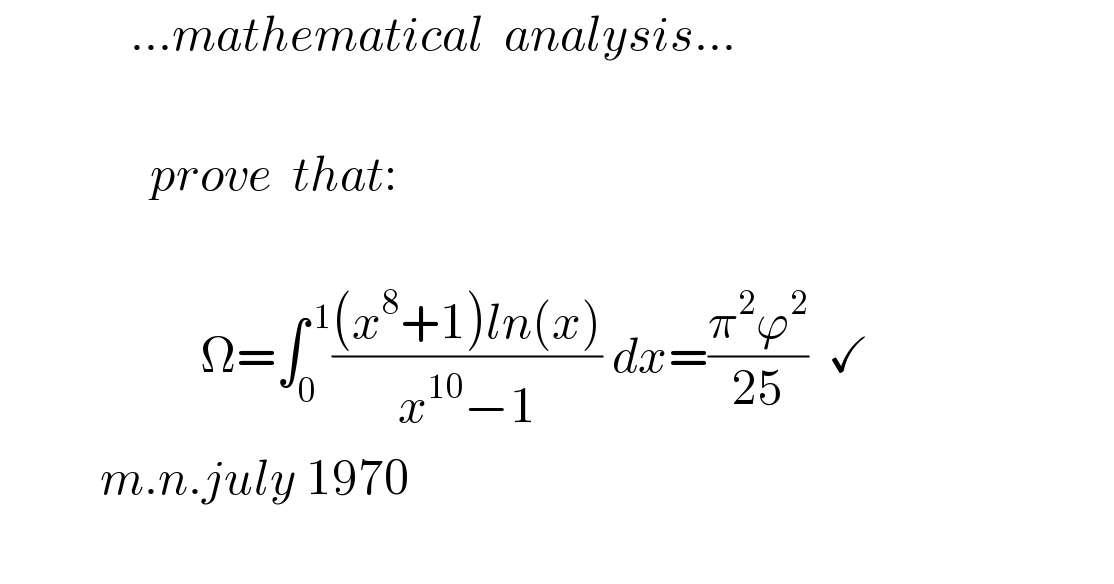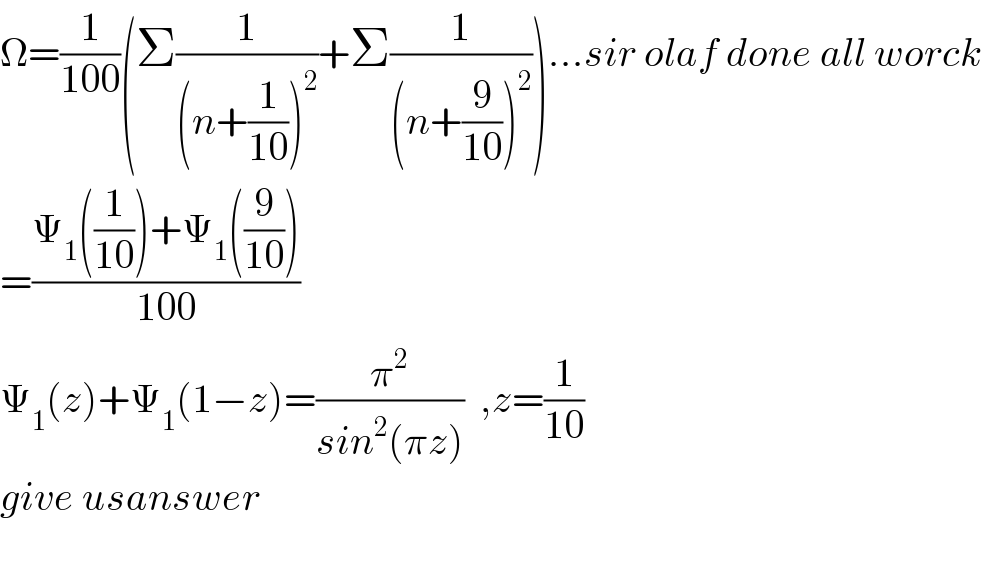
Question and Answers Forum
Question Number 115111 by mnjuly1970 last updated on 23/Sep/20

Answered by Olaf last updated on 23/Sep/20
![∫((1+x^8 )/(1−x^(10) ))dx = ∫(1+x^8 )Σ_(n=0) ^∞ x^(10n) dx = Σ_(n=0) ^∞ ((x^(10n+1) /(10n+1))+(x^(10n+9) /(10n+9))) Ω = [−Σ_(n=0) ^∞ ((x^(10n+1) /(10n+1))+(x^(10n+9) /(10n+9)))lnx]_0 ^1 +∫_0 ^1 Σ_(n=0) ^∞ ((x^(10n+1) /(10n+1))+(x^(10n+9) /(10n+9)))(dx/x) Ω = ∫_0 ^1 Σ_(n=0) ^∞ ((x^(10n) /(10n+1))+(x^(10n+8) /(10n+9)))dx Ω = Σ_(n=0) ^∞ [(x^(10n+1) /((10n+1)^2 ))+(x^(10n+9) /((10n+9)^2 ))]_0 ^1 Ω = Σ_(n=0) ^∞ [(1/((10n+1)^2 ))+(1/((10n+9)^2 ))] work in progress...](Q115134.png)
Commented by mnjuly1970 last updated on 23/Sep/20

Commented by maths mind last updated on 24/Sep/20

Answered by mathdave last updated on 24/Sep/20
![solution let I=∫_0 ^1 (((x^8 +1)lnx)/(x^(10) −1))dx=−∫_0 ^1 ((x^8 lnx)/(1−x^(10) ))dx−∫_0 ^1 ((lnx)/(1−x^(10) ))dx I=−Σ_(n=0) ^∞ ∫_0 ^1 x^8 .x^(10n) .lnxdx−Σ_(n=0) ^∞ ∫^1 _0 x^(10n) lnxdx I=−Σ_(n=0) ^∞ (∂/∂a)∣_(a=1) ∫_0 ^1 x^(10n+8) .x^(a−1) dx−Σ_(n=0) ^∞ (∂/∂a)∣_(a=1) ∫_0 ^1 x^(10n) .x^(a−1) dx I=−Σ_(n=0) ^∞ (∂/∂a)∣_(a=1) ((1/(10n+8+a)))−Σ_(n=0) ^∞ (∂/∂a)∣_(a=1) ((1/(10n+a))) I=Σ_(n=0) ^∞ (1/((10n+9)^2 ))+Σ_(n=0) ^∞ (1/((10n+1)^2 ))=Σ_(n=−∞) ^∞ (1/((10n+1)^2 )) I=Σ_(n=−∞) ^∞ (1/((10n+1)^2 ))=−(π/(100))lim_(z→−(1/(10))) (1/(1!))(d/dz)(cot(πz) I=−(π/(100))lim_(z→−(1/(10)) ) −πcosec^2 (−(π/(10)))=(π^2 /(100))•(1/(sin^2 ((π/(10))))) let ((90)/5)=18 let x=18 ∵90=5x=2x+3x 90−3x=2x ,sin(90−3x)=sin(2x) cos(3x)=sin(2x) 4cos^3 x−3cosx=2sinxcosx ,4cos^2 x−3=2sinx 4(1−sin^2 x)−3=2sinx ,4sin^2 x+2sinx−1=0 sinx=((−2±(√(4+16)))/8)=((−1+(√5))/4) ∵sin18=sin((π/(10)))=((−1+(√5))/4) sin^2 ((π/(10)))=[((−1+(√5))/4)]^2 =((3−(√5))/8) I=(π^2 /(100))•(1/(sin^2 ((π/(10)))))=(π^2 /(100))•(8/((3−(√(5)))))=(π^2 /(25))•(1/(((3/2)−((√5)/2)))) by linear approximation method of (a+b)^n =(a+nb) I=(π^2 /(25))•((3/2)−((√5)/2))^(−1) =(π^2 /(25))((3/2)+((√5)/2)) but ((1/2)+((√5)/2))^2 =((3/2)+((√5)/2)) note φ^2 =((1/2)+((√5)/2))^2 ∵I=∫_0 ^1 (((x^8 +1)lnx)/(x^(10) −1))dx=(π^2 /(25))φ^2 Q.E.D by mathdave(24/09/2020)](Q115161.png)
Commented by mnjuly1970 last updated on 24/Sep/20

Commented by Tawa11 last updated on 06/Sep/21

